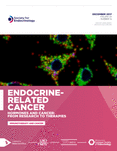The impact of ovulation on fallopian tube epithelial cells: evaluating three hypotheses connecting ovulation and serous ovarian cancer
- Shelby M King,
- Tyvette S Hilliard,
- Lucia Y Wu,
- Randal C Jaffe1,
- Asgerally T Fazleabas2 and
- Joanna E Burdette
- Department of Medicinal Chemistry and Pharmacognosy, University of Illinois at Chicago College of Pharmacy, 900 S. Ashland, Chicago, Illinois 60612, USA
1Department of Physiology and Biophysics, University of Illinois at Chicago, 835 S. Wolcott Avenue, Chicago, Illinois 60612, USA
2Department of Obstetrics, Gynecology, and Reproductive Biology, Michigan State University College of Human Medicine, 333 Bostwick Avenue NE, Grand Rapids, Michigan 49503, USA
- (Correspondence should be addressed to J E Burdette; Email: joannab{at}uic.edu)
Abstract
Ovarian cancer is the most lethal gynecological malignancy affecting American women. Current hypotheses concerning the etiology of ovarian cancer propose that a reduction in the lifetime number of ovulations decreases ovarian cancer risk. Advanced serous carcinoma shares several biomarkers with fallopian tube epithelial cells, suggesting that some forms of ovarian carcinoma may originate in the fallopian tube. Currently, the impact of ovulation on the tubal epithelium is unknown. In CD1 mice, ovulation did not increase tubal epithelial cell (TEC) proliferation as measured by bromodeoxyuridine incorporation and proliferating cell nuclear antigen staining as compared to unstimulated animals. In superovulated mice, an increase in the number of pro-inflammatory macrophages was detected in the oviduct. Ovulation also increased levels of phospho-γH2A.X in TEC, indicating that these cells were susceptible to double-strand DNA breakage following ovulation. To determine which components of ovulation contributed to DNA damage in the fallopian tube, an immortalized baboon TEC cell line and a three-dimensional organ culture system for mouse oviduct and baboon fallopian tubes were developed. TEC did not proliferate or display increased DNA damage in response to the gonadotropins or estradiol alone in vitro. Oxidative stress generated by treatment with hydrogen peroxide or macrophage-conditioned medium increased DNA damage in TEC in culture. Ovulation may impact the fallopian tube epithelium by generating DNA damage and stimulating macrophage infiltration but does not increase proliferation through gonadotropin signaling.
- Revision received 8 July 2011
- Accepted 3 August 2011
- Made available online as an Accepted Preprint 3 August 2011
- © 2011 Society for Endocrinology












